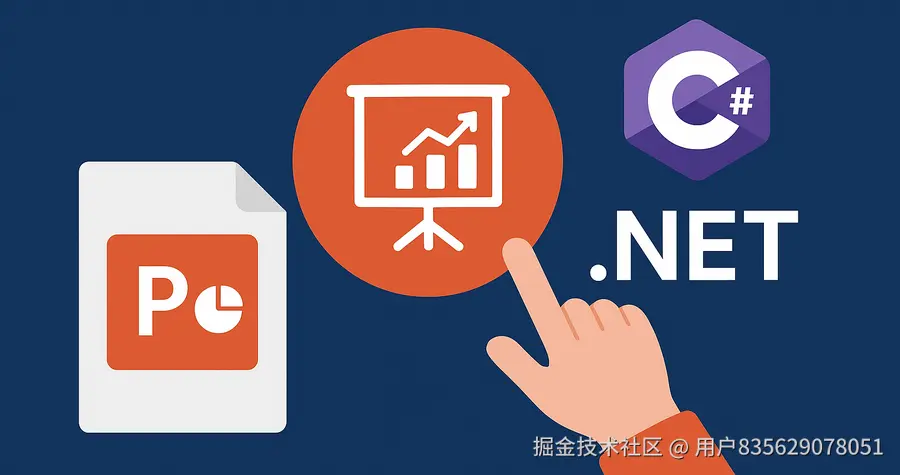
在当今快节奏的商业环境中,演示文稿是信息传递和沟通的关键工具。然而,手动创建和更新PowerPoint演示文稿往往耗时且易出错,尤其当需要批量生成或根据动态数据更新内容时,其低效性更是显而易见。对于C#开发者而言,这正是自动化解决方案大展身手之处。通过编程方式生成和操作PowerPoint,我们不仅能显著提升效率,还能确保内容的一致性和精确性。
本文将深入探讨如何利用C#语言结合功能强大的第三方库 Spire.Presentation for .NET,从零开始创建、编辑和保存PowerPoint演示文稿。我们将提供详细的步骤指导和可直接运行的代码示例,帮助您掌握自动化生成PPT的核心技术,从而将繁琐的手动工作转化为高效的编程任务。
环境准备与Spire.Presentation安装
要开始使用C#进行PowerPoint自动化,我们首先需要引入Spire.Presentation for .NET库。这是一个专业的.NET组件,专为处理PowerPoint文件而设计,提供了丰富的API接口来创建、读取、写入和修改PPT/PPTX文档。
安装步骤:
- 创建C#项目: 在Visual Studio中创建一个新的C#控制台应用程序或任何您需要的项目类型。
- 通过NuGet安装Spire.Presentation:
- 在Visual Studio中,右键点击您的项目,选择"管理NuGet程序包"。
- 在"浏览"选项卡中搜索"Spire.Presentation"。
- 找到"Spire.Presentation"包并点击"安装"。
安装完成后,您需要在代码文件中添加必要的using声明:
csharp
using Spire.Presentation;
using Spire.Presentation.Drawing;
using Spire.Presentation.Drawing.Shapes;
using System.Drawing; // 用于图像处理
using System.IO; // 用于文件操作第一个"Hello World"示例:创建并保存空白演示文稿
让我们从一个最简单的例子开始,创建一个空白的演示文稿并将其保存为PPTX文件。
csharp
using Spire.Presentation;
using System.IO;
public class Program
{
public static void Main(string[] args)
{
// 创建一个新的演示文稿实例
Presentation presentation = new Presentation();
// 获取第一张幻灯片(默认会有一张空白幻灯片)
ISlide slide = presentation.Slides[0];
// 在幻灯片上添加一个简单的文本框
IAutoShape shape = slide.Shapes.AppendShape(ShapeType.Rectangle, new RectangleF(50, 100, 600, 150));
shape.Fill.FillType = FillFormatType.None; // 无填充
shape.ShapeStyle.LineColor.Color = Color.White; // 无边框
// 设置文本框内容
shape.TextFrame.Text = "Hello from C# Automated PowerPoint!";
shape.TextFrame.Paragraphs[0].TextRanges[0].Fill.FillType = FillFormatType.Solid;
shape.TextFrame.Paragraphs[0].TextRanges[0].Fill.SolidColor.Color = Color.Black;
shape.TextFrame.Paragraphs[0].TextRanges[0].FontHeight = 30;
// 保存到文件系统
string outputPath = "MyFirstAutomatedPresentation.pptx";
presentation.SaveToFile(outputPath, FileFormat.Pptx2016); // 选择保存格式
Console.WriteLine($"演示文稿已保存到: {outputPath}");
// 也可以保存到流
using (FileStream to_stream = new FileStream("SaveToStream.pptx", FileMode.Create))
{
presentation.SaveToFile(to_stream, FileFormat.Pptx2013);
}
Console.WriteLine("演示文稿已保存到流: SaveToStream.pptx");
}
}核心操作:添加与编辑幻灯片元素
掌握了基础的创建和保存,接下来我们将深入探讨如何向演示文稿中添加和操作各种元素。
添加幻灯片
Spire.Presentation允许您添加空白幻灯片或基于预定义布局的幻灯片。
csharp
// 添加一张空白幻灯片
ISlide newBlankSlide = presentation.Slides.Append();
// 添加一张基于标题和内容布局的幻灯片
// 获取布局模板
IMasterSlide master = presentation.Masters[0]; // 通常第一个是默认母版
ISlideLayout titleAndContentLayout = master.SlideLayouts[SlideLayoutType.TitleAndContent];
ISlide newTitleContentSlide = presentation.Slides.Append(titleAndContentLayout);
// 设置新幻灯片的标题
ITextBox titleShape = newTitleContentSlide.Shapes.AddAutoShape(ShapeType.Rectangle, new RectangleF(50, 50, 900, 100));
titleShape.TextFrame.Text = "我的第二张幻灯片:标题和内容";
titleShape.TextFrame.Paragraphs[0].TextRanges[0].FontHeight = 40;
titleShape.TextFrame.Paragraphs[0].TextRanges[0].Fill.SolidColor.Color = Color.DarkBlue;文本操作
添加文本框并设置其格式是PPT中最常见的操作之一。
csharp
// 在第一张幻灯片上添加一个文本框
IAutoShape textBox = presentation.Slides[0].Shapes.AppendShape(ShapeType.Rectangle, new RectangleF(50, 200, 600, 100));
textBox.Fill.FillType = FillFormatType.None;
textBox.TextFrame.Text = "这是一段示例文本,用于演示格式设置。";
// 获取文本段落和文本范围
ITextParagraph paragraph = textBox.TextFrame.Paragraphs[0];
ITextRange textRange = paragraph.TextRanges[0];
// 设置字体、大小和颜色
textRange.FontHeight = 24;
textRange.Fill.FillType = FillFormatType.Solid;
textRange.Fill.SolidColor.Color = Color.Red;
textRange.LatinFont = new TextFont("Arial"); // 设置字体
// 设置加粗和斜体
textRange.IsBold = true;
textRange.IsItalic = true;
// 文本对齐
paragraph.Alignment = TextAlignmentType.Center;
// 添加更多段落
paragraph = textBox.TextFrame.Paragraphs.Append("这是第二个段落。");
paragraph.Alignment = TextAlignmentType.Left;
paragraph.TextRanges[0].FontHeight = 18;
paragraph.TextRanges[0].Fill.SolidColor.Color = Color.Green;图片插入
从文件或流中插入图片,并调整其位置和大小。
csharp
// 假设图片文件存在
string imagePath = "sample.png"; // 替换为您的图片路径
if (File.Exists(imagePath))
{
// 将图片添加到演示文稿的图片集合中
IImageData imageData = presentation.Images.Append(File.ReadAllBytes(imagePath));
// 在第二张幻灯片上插入图片
newTitleContentSlide.Shapes.AddPicture(imageData, new RectangleF(100, 200, 400, 300)); // 位置和大小
}
else
{
Console.WriteLine($"图片文件 {imagePath} 不存在。");
}形状与图表(示例)
Spire.Presentation也支持添加各种形状和图表。这里我们以添加一个矩形和简要提及图表为例。
csharp
// 在第一张幻灯片上添加一个蓝色矩形
IAutoShape rectangle = presentation.Slides[0].Shapes.AppendShape(ShapeType.Rectangle, new RectangleF(700, 100, 150, 80));
rectangle.Fill.FillType = FillFormatType.Solid;
rectangle.Fill.SolidColor.Color = Color.Blue;
rectangle.TextFrame.Text = "自定义形状";
rectangle.TextFrame.Paragraphs[0].TextRanges[0].Fill.SolidColor.Color = Color.White;
// 添加一个简单的柱状图 (需要更多数据和配置,这里仅作示意)
// IChart chart = presentation.Slides[0].Shapes.AppendChart(ChartType.ColumnClustered, new RectangleF(100, 400, 700, 300));
// chart.ChartData[0, 0].Text = "类别 A";
// chart.ChartData[1, 0].Text = "系列 1";
// ... 更多图表数据和样式配置 ...高级技巧与最佳实践
模板应用
为了保持演示文稿的专业外观和一致性,通常会基于现有模板创建。
csharp
// 加载一个现有模板文件
// string templatePath = "MyTemplate.pptx"; // 替换为您的模板路径
// Presentation templatePres = new Presentation();
// templatePres.LoadFromFile(templatePath);
// // 从模板中创建一个新演示文稿
// Presentation newPresentationFromTemplate = new Presentation(templatePres);
// // 现在可以在 newPresentationFromTemplate 上进行操作,它会继承模板的样式和母版保存与导出
除了保存为PPTX文件,Spire.Presentation还支持将演示文稿导出为其他常用格式,例如PDF。
csharp
// 保存为PDF
string pdfPath = "OutputPresentation.pdf";
presentation.SaveToFile(pdfPath, FileFormat.Pdf);
Console.WriteLine($"演示文稿已导出为PDF: {pdfPath}");错误处理与资源释放
在进行文件操作时,错误处理至关重要。同时,确保及时释放资源是一个良好的编程习惯。Spire.Presentation的Presentation对象实现了IDisposable接口,建议使用using语句来确保资源被正确释放。
csharp
using (Presentation presentation = new Presentation())
{
// 执行所有PPT操作
// ...
presentation.SaveToFile("output.pptx", FileFormat.Pptx2016);
} // presentation 对象在此处自动被释放对于可能抛出异常的操作,使用try-catch块来捕获和处理错误,以增强程序的健壮性。
csharp
try
{
// 尝试执行某些可能失败的操作,例如加载不存在的文件
// presentation.LoadFromFile("non_existent_file.pptx");
}
catch (FileNotFoundException ex)
{
Console.WriteLine($"文件未找到错误: {ex.Message}");
}
catch (Exception ex)
{
Console.WriteLine($"发生了一个错误: {ex.Message}");
}总结
本文详细介绍了如何利用C#和Spire.Presentation for .NET库自动化生成和操作PowerPoint演示文稿。从环境搭建到核心元素操作,再到高级技巧和最佳实践,我们提供了实用的代码示例和深入的解释。通过这些技术,C#开发者可以轻松实现批量报告生成、数据可视化演示、动态内容更新等多种PowerPoint自动化需求,极大地提升工作效率和数据呈现的专业度。
掌握PowerPoint自动化,将使您能够将重复性的演示文稿创建工作转化为可编程、可扩展的解决方案。